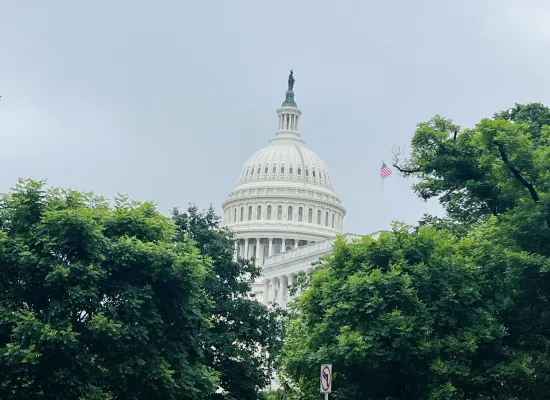
Federal Update: Senators Reach Deal to End Shutdown
On Sunday, November 9, Senate Majority Leader Thune announced that he had reached an agreement with a group of 8 Democratic senators and the White House on a deal to end the longest shutdown in U.S. history. On Monday, November 10, the Senate approved the government funding bill by a vote of 60-40, which sends the legislative package back to the House of Representatives.
What’s the Deal?
The Senate bill extends funding under a continuing resolution (CR) for most government agencies, including the Department of Health and Human Services (HHS) at their fiscal year (FY) 2025 levels, through January 30, 2026. The bill also extends authorization for health care programs that expired on September 30—including Medicare telehealth flexibilities, delays on cuts to Medicaid Disproportionate Share Hospitals, and Graduate Medical Education funding—to January 30, 2026. Appropriators reached an agreement on a “minibus” with three FY 2026 appropriations packages, encompassing the Department of Agriculture and the Food & Drug Administration; the Department of Veterans Affairs and Military Construction; and the Legislative Branch.
The Democrats secured handshake agreements from Majority Leader Thune and the Trump administration regarding the expiration of enhanced premium tax credits (PTCs) and federal workers who received Reduction-in-Force (RIF) notices during the shutdown. The Trump administration agreed to rescind the RIF notices sent to thousands of federal workers last month, including approximately 1,200 HHS employees. Majority Leader Thune agreed to hold a vote on a bill of the Democrats’ choosing related to the enhanced PTCs—which are set to expire on December 31—by the end of the second week of December. Importantly, this does not guarantee that Congress will extend the PTCs; it only ensures that the Senate will vote on a package. Thune has previously stated that he does not believe any proposal extending the enhanced PTCs could garner the required 60 votes in the Senate. Speaker Mike Johnson has not committed to holding a vote on the enhanced PTCs, which further complicates the path to extending the ACA subsidies.
Next Steps
The House of Representatives has been out of session since it passed its original CR on September 19. After the Senate approved the CR on November 10, Speaker Johnson gave House members 36 hours' notice to return to the Capitol to vote on the legislative package, which means that the chamber could vote as early as the evening of Wednesday, November 12. Republicans have only a 2-vote margin, and leadership is closely watching members who have expressed concerns about the expiring subsidies, such as Rep. Marjorie Taylor Greene (R-GA). Minority Leader Jeffries is urging House Democrats to vote against the CR because it does not address the expiring enhanced PTCs, though a handful of rank-and-file Democrats could vote with Republicans to end the shutdown. Once the House passes the CR, President Trump is expected to quickly sign the bill to end the shutdown.
Majority Leader Thune agreed to vote on a Democrat-selected PTC bill by mid-December. Majority Leader Thune and Minority Leader Schumer have provided insight into potential negotiations to extend the expiring enhanced PTCs. After the Senate voted to approve the CR, Thune told reporters that Senate Finance Chair Mike Crapo, Senate Health, Education, Labor and Pensions Chair Bill Cassidy, GOP Steering Committee Chair Rick Scott, and Senator Roger Marshall will lead talks with Democrats. Schumer is expected to lead negotiations alongside Senate Finance Ranking Member Ron Wyden and Senator Jeanne Shaheen, who helped broker the compromise CR.
The CR buys Congress time to negotiate FY 2026 appropriations for HHS and other government agencies not included in the minibus. Congress must also reach an agreement on health extenders that are set to expire on January 30. This could form the basis of a larger health package that includes pharmacy benefit manager (PBM) reform, Medicare site-neutral payment reform, fixes to the 340B drug discount program, and other priorities that have been on the back burner during this Congress.
Featured News & Resources
See Full CalendarAward Applications Open
AMCP eLearning Day: Nexus Encore
Upcoming Events
AMCP offers a wide variety of educational opportunities, from events and webinars to online training.







